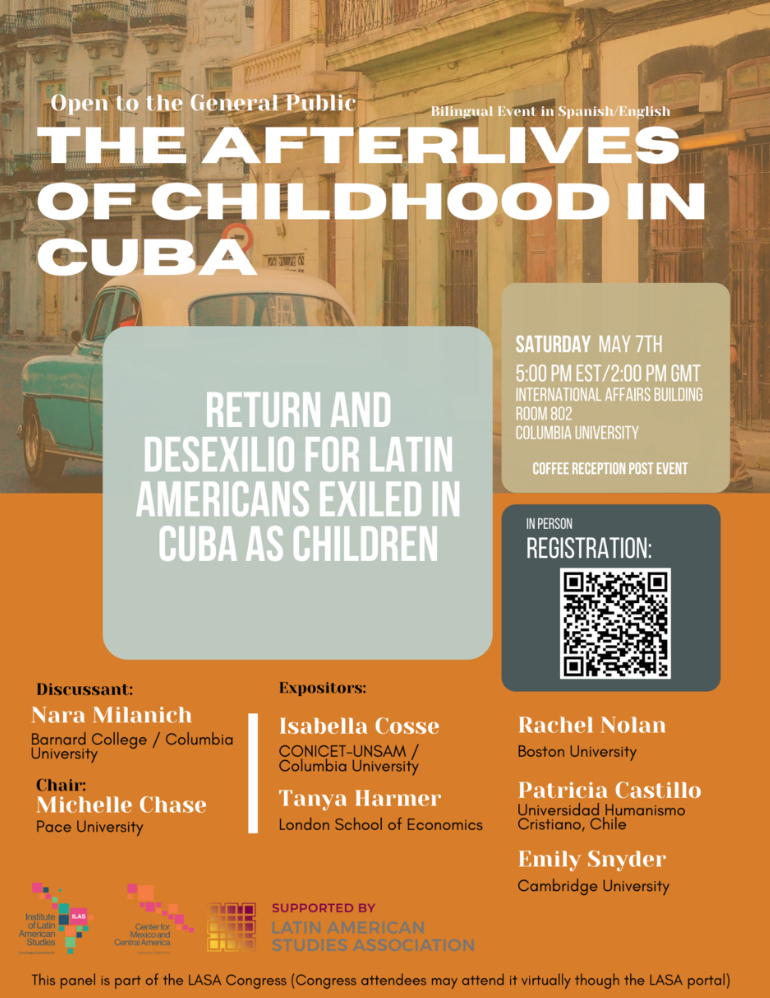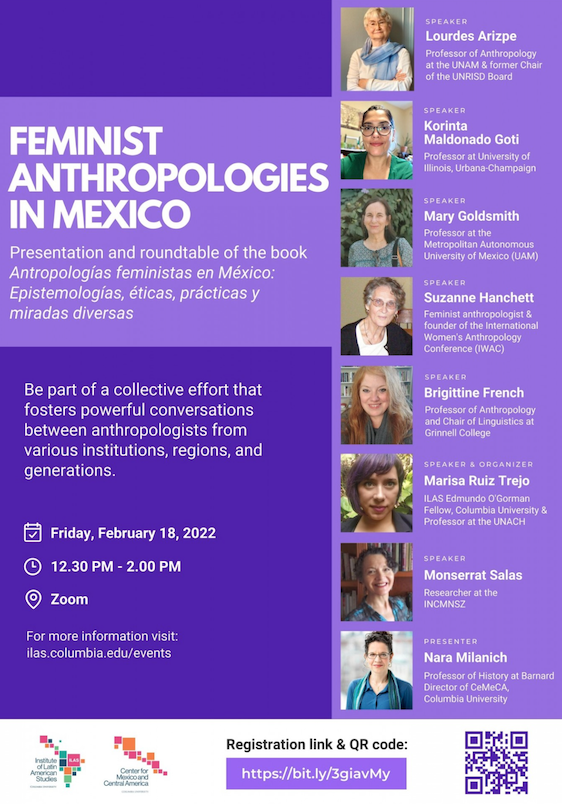CeMeCA's Events
Fall 2021 - Spring 2022
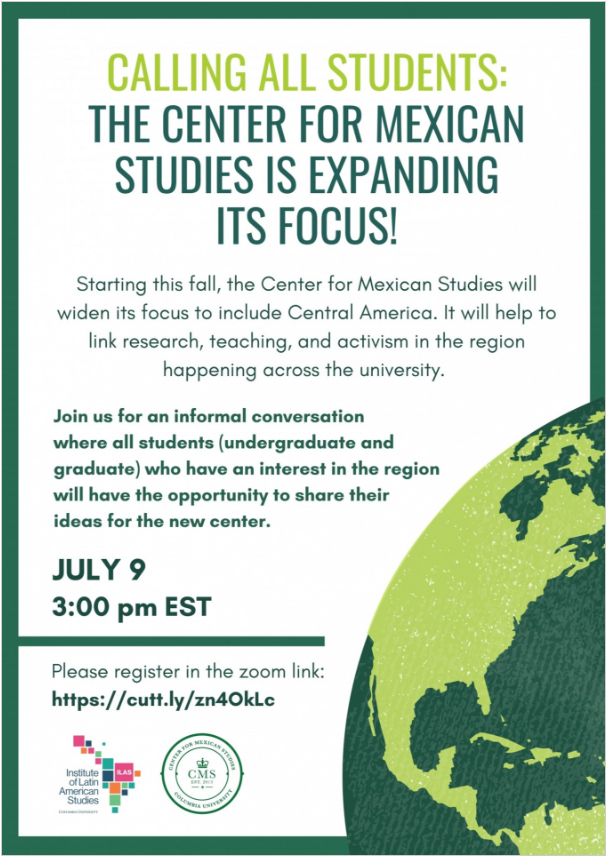
Calling All Students: The Center for Mexican Studies Is Expanding Its Focus!
The Center for Mexican Studies is expanding its focus! Starting this fall, the Center for Mexican Studies will widen its focus to include Central America. It will help to link research, teaching, and activism in the region happening across the university. The new center will oversee projects that sit at the intersection of academic, advocacy, and activist work. We will begin with a special focus on issues of migration, human rights, violence, gender, and childhood, but we welcome those with other interests as well.
We’re convening a listening session for students from across the university interested in participating in the center. What ideas do you have for the new center? How can it serve students? Please join us for an informal conversation,
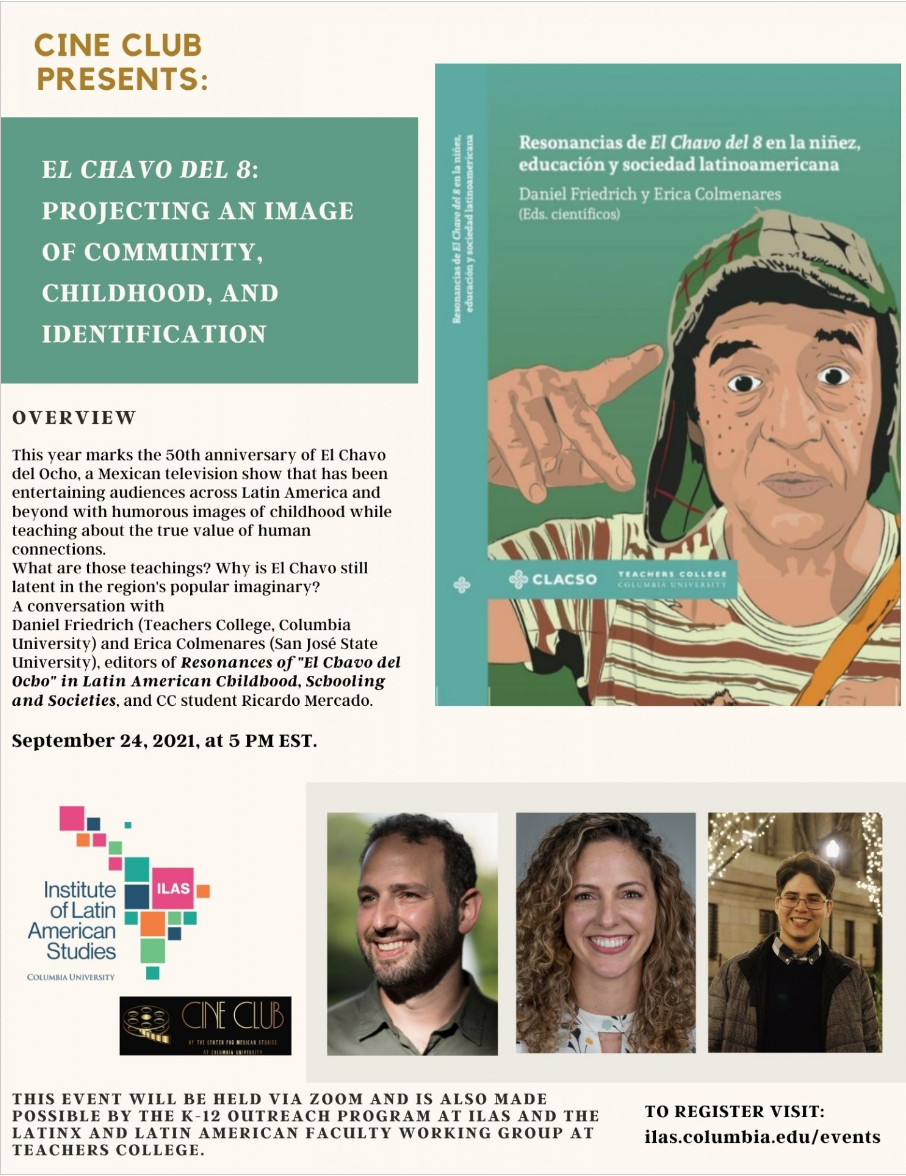
El Chavo del 8: Projecting an Image of Community, Childhood, and Identification
Over the span of three generations, the popular 1970's television show El Chavo del Ocho has been entertaining audiences across Latin America and beyond with humorous images of childhood and community, but which taught at the same time about the true value of human connections. What are those teachings? Why is El Chavo still latent in the region's popular imaginary?
50 years after the show's debut, the Cine Club at the Center for Mexico and Central America, in partnership with the K-12 Outreach Program at ILAS, and the Latinx and Latin American Faculty Working Group at Teachers College, Columbia University, invite you to join Professors Daniel Friedrich and Erica Colmenares (Resonances of El Chavo del Ocho in Latin American Childhood, Schooling and Societies, 2017, Bloomsbury Press) as they discuss El Chavo's socio-cultural impact on contemporary Latin America, with a special focus on education.
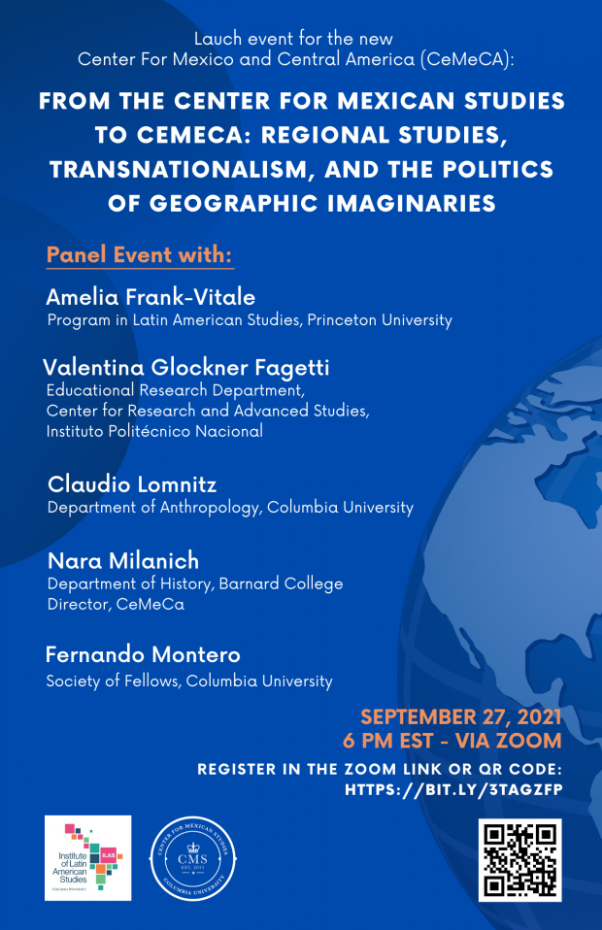
From the Center for Mexican Studies to CeMeCA: Regional Studies, Transnationalism, and the politics of Geographic Imaginaries
Launch event for the New Center for Mexican and Central American Studies
Panel Event with:
- Amelia Frank-Vitale - Program in Latin American Studies, Princeton University
- Valenina Glockner Fagetti - Educational Research Department, Center for Research and Avanced Studies, Instituto Politecnico Nacional
- Claudio Lomnitz - Department of Anthropology, Columbia University
- Nara Milanich - Department of History, Barnard College. Director of CeMeCa
- Fernando Monteiro - Society of Fellows, Columbia University
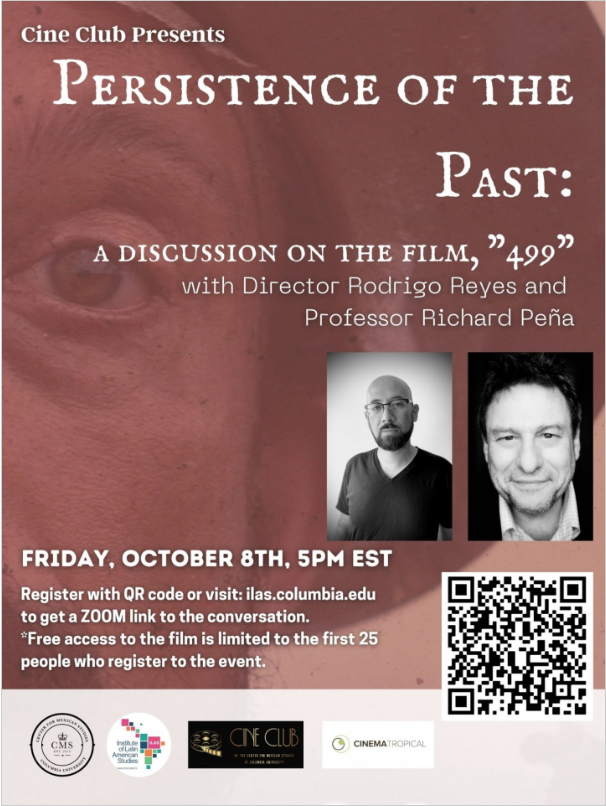
Persistence of the Past: A Discussion on the Film "499" with Director Rodrigo Reyes and School of the Arts Professor Richard Peña
On the 500th anniversary of the Spanish Conquest of the Americas, it is clear/evident/etc that the legacy of colonialism in Latin America and its present-day implications in the region have had a long-lasting impact on its people and culture. In his film 499, weaving together a documentary and narrative film to illustrate the continuation of the Conquest into today, Rodrigo Reyes explores this legacy in modern Mexico through a mix of real-life experiences and the fictional perspective/ viewpoint of a Conquistador returning to the present-day realities that colonialism has left.
Join the Cine Club, with the Center for Mexican and Central American Studies, Director Rodrigo Reyes (499), and Columbia Film Professor and Former Director of the Lincoln Center Film Society, Richard Peña, for a discussion about the historical and present-day significance of the film 499 and the role it plays in Latin American arts, history, and culture. 499 has received support from the Sundance Institute,Tribeca Film Institute,and the Mexican Film Institute.
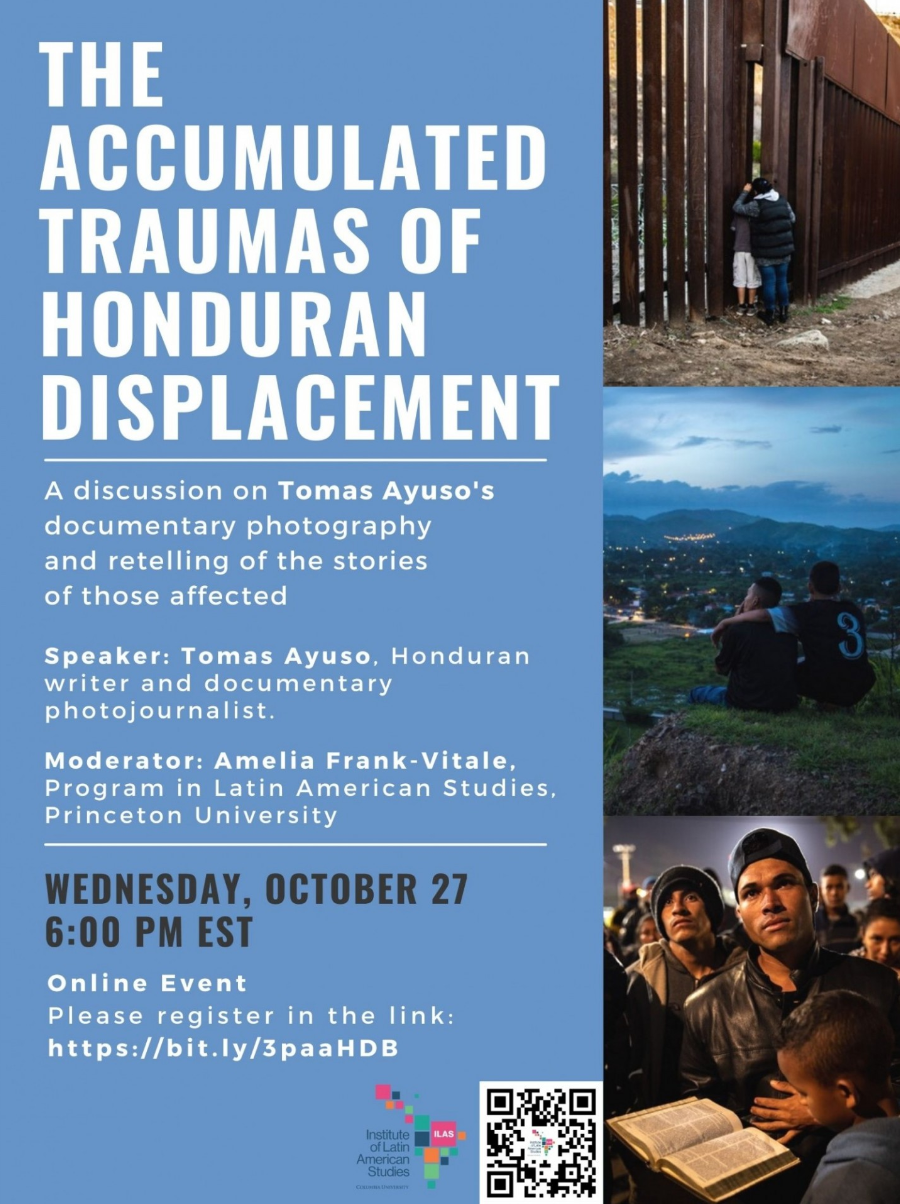
The Accumulated Traumas of Honduran Displacement - Center for Mexico and Central America
Since 2009, displacement out of Honduras has increased exponentially every year as crisis after interconnected crisis piles onto the cities and villages of the country. The consequences of political instability, generalized violence, and abyssal inequality push hundreds of thousands of Hondurans abroad in search of the shelter and dignity they were stripped of at home. It is also in the decade-plus of permanent catastrophe that effects of factors of displacement exacerbate open wounds in the mental health of those that stay behind.
With documentary photography and retelling the stories of those affected, the inward and outward complexities wrought by Honduran displacement will be shared as part of this speaking series.
This conversation will feature photographer Tomas Ayuso, who is a National Geographic Explorer, recipient of the James Foley Award for Conflict Journalism, and a World Press Photo Global Talent. His work has been exhibited in galleries and public spaces around the world. Currently, Tomas is teaching photography and storytelling workshops for underrepresented communities in the Americas.
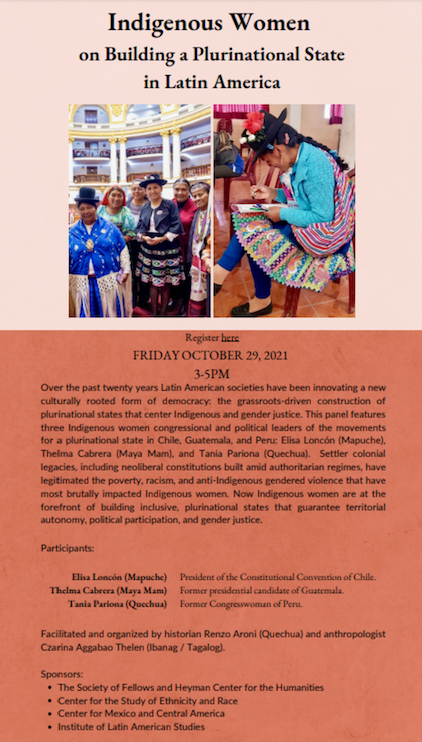
Indigenous Women on Building a Plurinational State in Latin America
Over the past twenty years Latin American societies have been innovating a new culturally rooted form of democracy: the grassroots-driven construction of plurinational states that center Indigenous and gender justice. This panel features three Indigenous women congressional and political leaders of the movements for a plurinational state in Chile, Guatemala, and Peru: Elisa Loncón (Mapuche), Thelma Cabrera (Maya Mam), and Tania Pariona (Quechua). Settler colonial legacies, including neoliberal constitutions built amid authoritarian regimes, have legitimated the poverty, racism, and anti-Indigenous gendered violence that have most brutally impacted Indigenous women. Now Indigenous women are at the forefront of building inclusive, plurinational states that guarantee territorial autonomy, political participation, and gender justice.
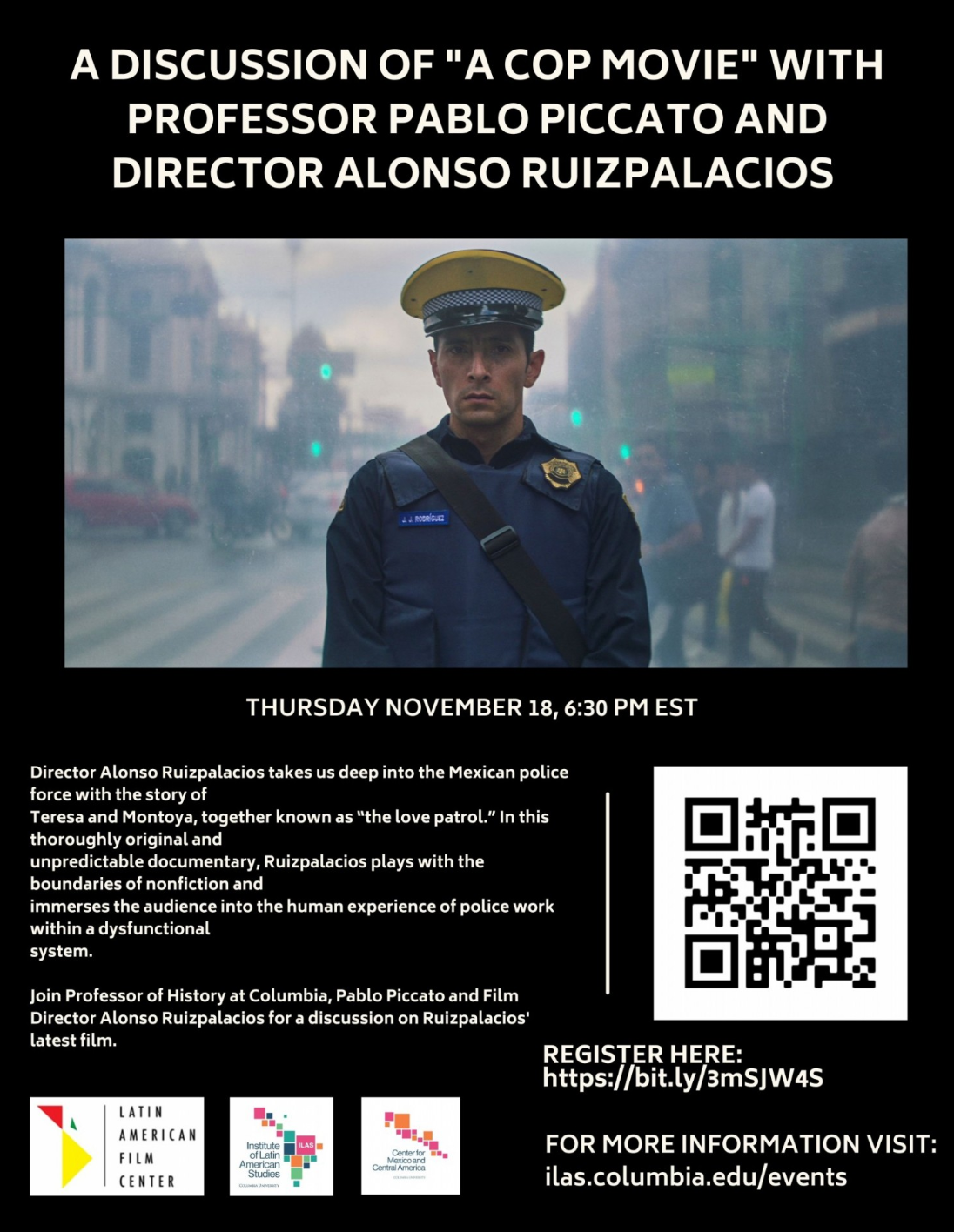
"A Cop Movie": Discussion with Pablo Piccato and Alonso Ruizpalacios
Following family tradition, Teresa and Montoya join the police force, only to find their convictions and hopes crushed by a dysfunctional system. Their emotional bond becomes a refuge for the hostility they are exposed to. Through an experimental style of narrative and
documentary storytelling, A COP MOVIE propels the viewer into an unusual cinematic space, giving voice to one of Mexico and the world's most controversial institutions.
Director Alonso Ruizpalacios takes us deep into the Mexican police force with the story of Teresa and Montoya, together known as “the love patrol.” In this thoroughly original and unpredictable documentary, Ruizpalacios plays with the boundaries of nonfiction and
immerses the audience into the human experience of police work within a dysfunctional system.
Join Professor of History at Columbia, Pablo Piccato, and Film Director Alonso Ruizpalacios for a discussion on Ruizpalacios' latest film.
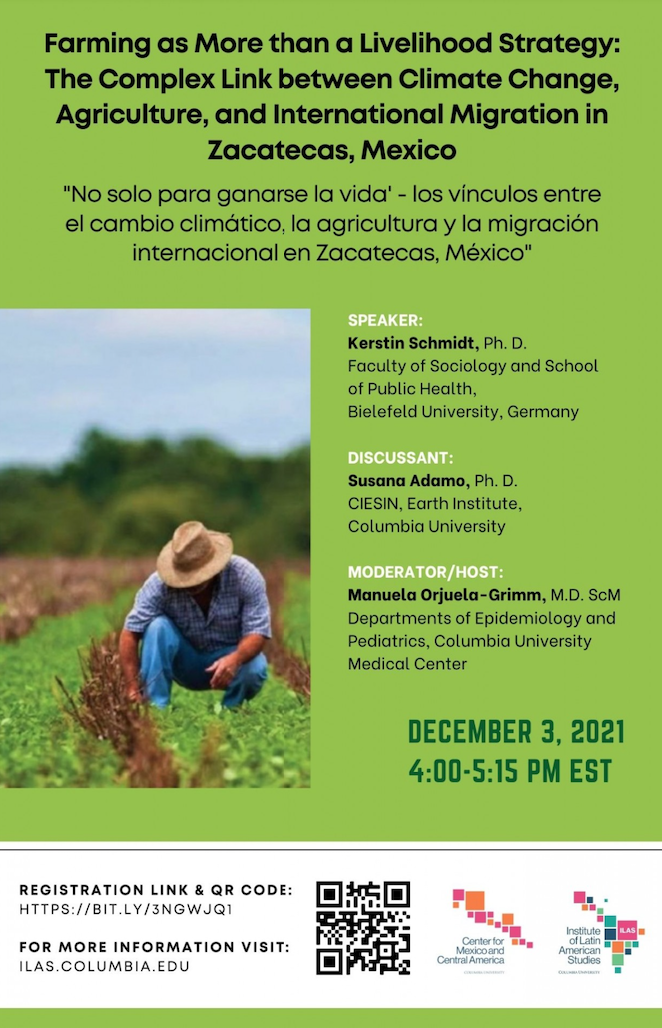
Farming as More than a Livelihood Strategy: The Complex Link between Climate Change, Agriculture, and International Migration in Zacatecas, Mexico
"No solo para ganarse la vida' - los vínculos entre el cambio climático, la agricultura y la migración internacional en Zacatecas, México"
Speaker:
Kerstin Schmidt, Ph.D.: Faculty of Sociology and School of Public Health, Bielefeld University, Germany.
Discussant:
Susana Adamo, CIESIN, Earth Institute, Columbia University.
Moderator/ Host:
Manuela Orjuela-Grimm, Departments of Epidemiology and Pediatrics, Columbia University Medical Center
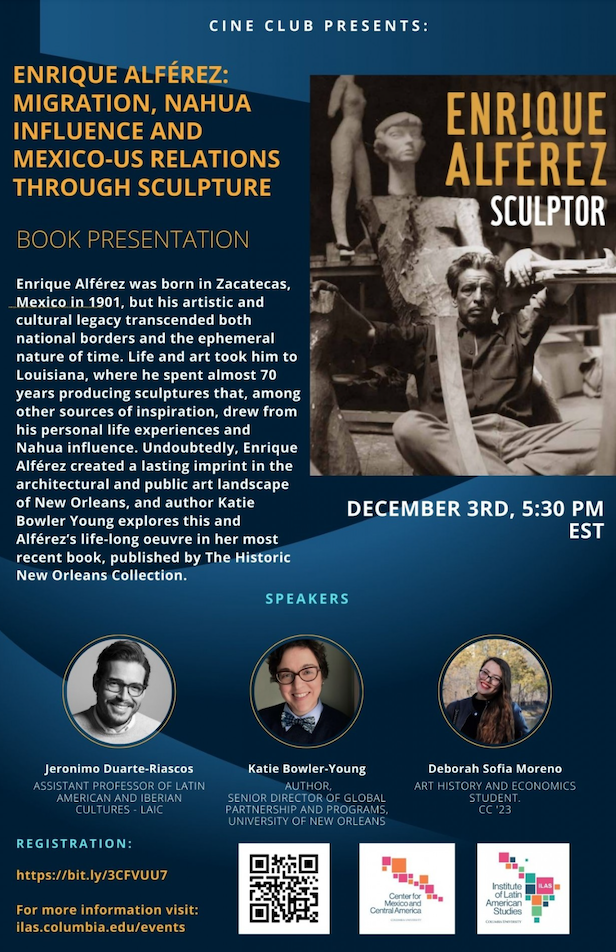
Book Presentation - Enrique Alférez: Migration, Nahua Influence and Mexico-US Relations Through Sculpture - Cine Club
Enrique Alférez was born in Zacatecas, Mexico in 1901, but his artistic and cultural legacy transcended both national borders and the ephemeral nature of time. Life and art took him to Louisiana, where he spent almost 70 years producing sculptures that, among other sources of inspiration, drew from his personal life experiences and Nahua influence. Undoubtedly, Enrique Alférez created a lasting imprint in the architectural and public art landscape of New Orleans, and author Katie Bowler Young explores this and Alférez’s life-long oeuvre in her most recent book, published by The Historic New Orleans Collection.
Join the Cine Club, along with Katie Bowler Young (author of the book Enrique Alférez: Sculptor), Professor Jerónimo Duarte-Riascos (Latin American and Iberian Cultures, Columbia University), and Deborah Moreno Ornelas (Art History and Economics student, Columbia University) for a conversation about art that knows no borders and has multiculturalism at its core. After an introduction to Alférez’s life and art, we’ll explore the artist's sculptural body of work through the thematic lenses of migration, Nahua influence, and Mexico-US relations. We’ll reflect upon the power of art in public spaces and the intimate relationship between social and political conditions and art-making as a source of historical memory.
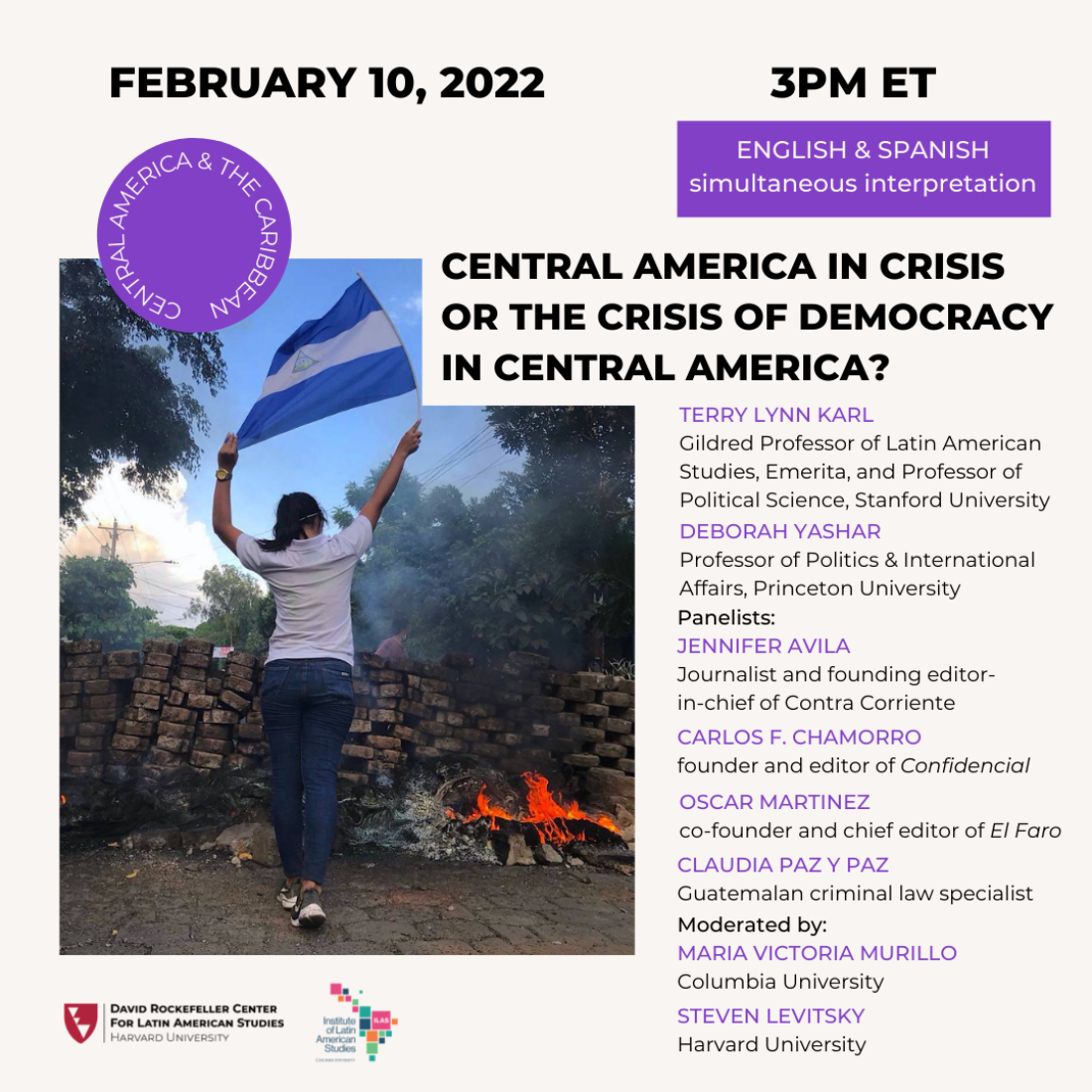
Central America in Crisis or Crisis of Democracy in Central America
This event is virtual and will be held in English with simultaneous Spanish interpretation. To register, click here.
Keynote speaker: Deborah Yashar, Professor of Politics and International Affairs, Princeton University
Panelists: Jennifer Avila, Journalist and founding editor-in-chief of Contra Corriente (Honduras); Carlos F Chamorro, independent investigative journalist; founder and editor of Confidencial (Nicaragua); Oscar Martinez, co-founder, coordinator, and chief editor of El Faro (El Salvador), author of Los Muertos y el Periodista; Claudia Paz y Paz, Guatemalan criminal law specialist, scholar, judge and litigator
Moderated by: Maria Victoria Murillo, Professor of Political Science & International Affairs, Columbia University; Director, ILAS; Steven Levitsky, Professor of Government, Harvard University; Director, DRCLAS
Presented in collaboration with the David Rockefeller Center for Latin American Studies, Harvard University.
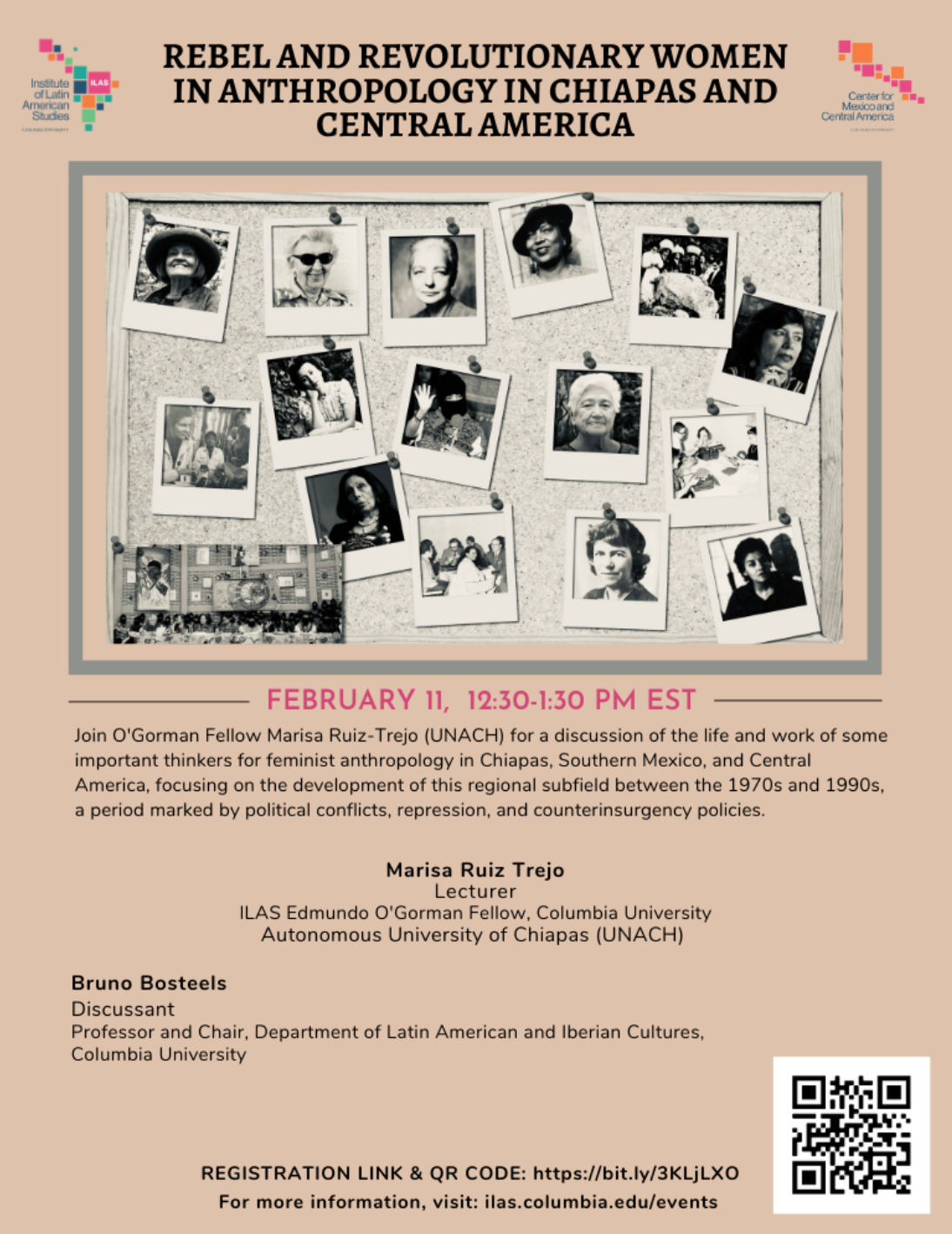
Rebel and Revolutionary Women in Anthropology in Central America
Join O'Gorman Fellow Marisa Ruiz-Trejo (UNACH) for a discussion of the life and work of some important thinkers for feminist anthropology in Chiapas, Southern Mexico, and Central America, focusing on the development of this regional subfield between the 1970s and 1990s, a period marked by political conflicts, repression, and counterinsurgency policies.
Speakers:
- Marisa Ruiz Trejo, ILAS Edmundo O'Gorman Fellow, Columbia University & professor at Autonomous University of Chiapas (UNACH)
-
Bruno Bosteels, professor and Chair, Department of Latin American and Iberian Cultures, Columbia University
Feminist Anthropologies in Mexico
Feminist Anthropologies in Mexico: Epistemologies, Ethics, Practices, and Diverse Looks is a collective effort that embodies a powerful conversation between anthropologists from various institutions, regions, and generations.
This book presentation and roundtable will discuss epistemological models that emerged in the 80s and methodological approaches, such as collaborative dialogues. Personal trajectories and issues approached from a feminist perspective are presented, which account for the persistence of patriarchal culture and structural violence that harms women's rights and other diverse subjects. In addition, the book shows expressions of agency, political activism, civil society organizations, indigenous, Afro-descendant, peasant, and LGBTQ+ women's movements—among others—showing us the validity of feminism as one of the most significant theoretical-political currents of this millennium. The work is a contribution to current debates and dialogue within and outside the anthropological sciences.
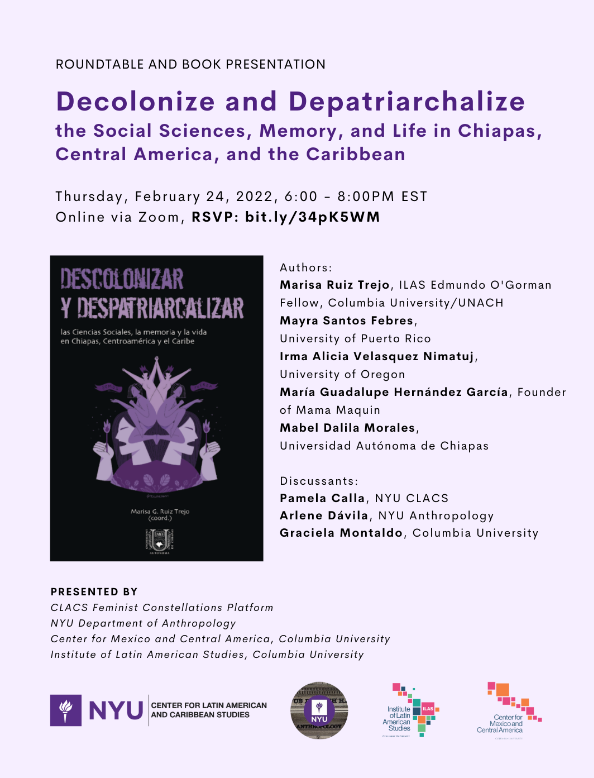
Decolonize and Depatriarchalize the Social Sciences
Join us to celebrate the launch of the new book: Decolonize and Depatriarchalize the Social Sciences, Memory, and Life in Chiapas, Central America, and the Caribbean. This book is a collection of writings by indigenous and Afro-descendant women and feminists, sexual dissidents, revolutionaries, and social activists from Chiapas, Central America, and the Caribbean. It includes results of anthropological studies, original and collaborative research, creative theoretical reflections, epistemologies, ethics, essays, and poetry.
In this roundtable and book presentation, we will focus on this book as an exercise of an intergenerational, interregional, and transnational alliance. And as a work of resistance for more critical, feminist, anti-racist, dissident, and anti-capitalist social sciences and humanities, in defense of life and territories.
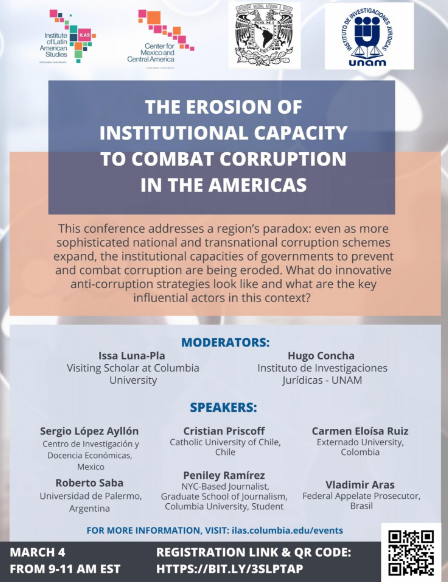
The Erosion of Institutional Capacity to Combat Corruption
Corruption is a prominent global public policy challenge of the 21st century. It is a complex and multifaceted phenomenon that impacts societies in multiple ways. It affects the development of democracies and the rule of law, weakens government institutions, hinders economic growth, degrades the environment, and ramp up the violation of human rights. The transnational flow of people, materials, and information has remarkably increased the levels of interactions at different spatial and administrative scales. Consequently, large networks of interrelated players across borders developing complex corruption structures and schemes are seen in cases such as the Pandora Papers or Odebrecht, while national corruption scandals involving business, shell companies, government officials, and political parties are equally escalated in many countries of the Americas.
In a more connected world than ever, larger amounts of data and information are also produced massively from various sources, ranging from journalism, civil society organizations, oversight agencies, and government. Nevertheless, political use of criminal justice, constant budget cutbacks to prosecution and accountability institutions, degradation of operation capacity, and selective austerity policies pose new challenges for intelligence, prosecution, and policymaking.
This conference addresses a regions' paradox: while more sophisticated national and transnational corruption schemes expand, the institutional capacities of governments to prevent and combat corruption are being eroded. What should innovative anti-corruption strategies look like, and what are the key influential actors in this context?
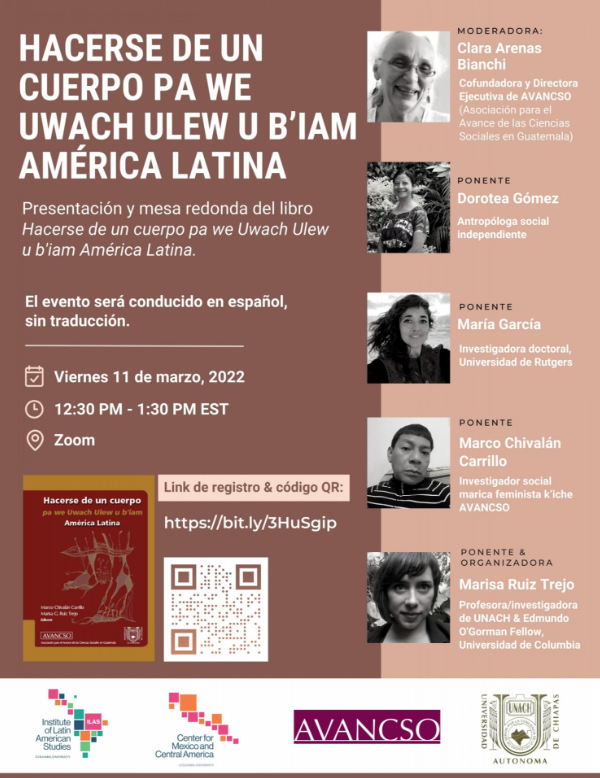
Hacerse de un cuerpo pa we Uwach Ulew u b’iam América Latina
En esta mesa redonda, presentaremos el libro “Hacerse de un cuerpo pa we Uwach Ulew u b’iam América Latina” (2022, AVANCSO, Guatemala – Universidad Autónoma de Chiapas, México), coordinado por Marco Chivalán, filósofo, feminista k’iche’, doctorante en historia social e investigador de AVANCSO, y por Marisa Ruiz Trejo, profesora/investigadora de la Universidad Autónoma de Chiapas y activista transfeminista. El evento será presentado por Clara Arenas, directora de AVANCSO, un centro de investigación independiente en Guatemala, comprometido con los movimientos sociales.
Continuaremos el hilo de la discusión iniciada con el libro Sexo y Raza: analíticas de la blancura, el deseo y la sexualidad en Guatemala (Texto para Debate No. 25, 2015) y el libro Producción Corporal. Interfiriendo engranajes de violencia en Guatemala (Texto para Debate No. 26, 2019).
En el evento, participarán como comentaristas Dorotea Gómez, investigadora y activista maya k´iché, lesbiana feminista, y María García, doctoranda de Rutgers, quienes profundizarán en algunas de las discusiones abordadas por algunxs de lxs autorxs.
El título del libro incorpora un concepto k’iche’ difícil de traducir que invita a tomar conciencia sobre las cosmogonías indígenas reflejadas en sus idiomas, pero también en los cuerpos atravesados por opresiones y resistencias. A través de textos escritos por investigadorxs, activistas, escritorxs y fotografxs de Guatemala, México y Argentina, el libro combina academia, arte, literatura y fotografía, para cartografiar y analizar esfuerzos conscientes para hacerse de un cuerpo deseado en la compleja e hiriente realidad colonial.
El libro es un trabajo coeditado entre AVANCSO y la Universidad Autónoma de Chiapas (UNACH) como una forma de intercambio abierto de perspectivas y experiencias en contextos coloniales.
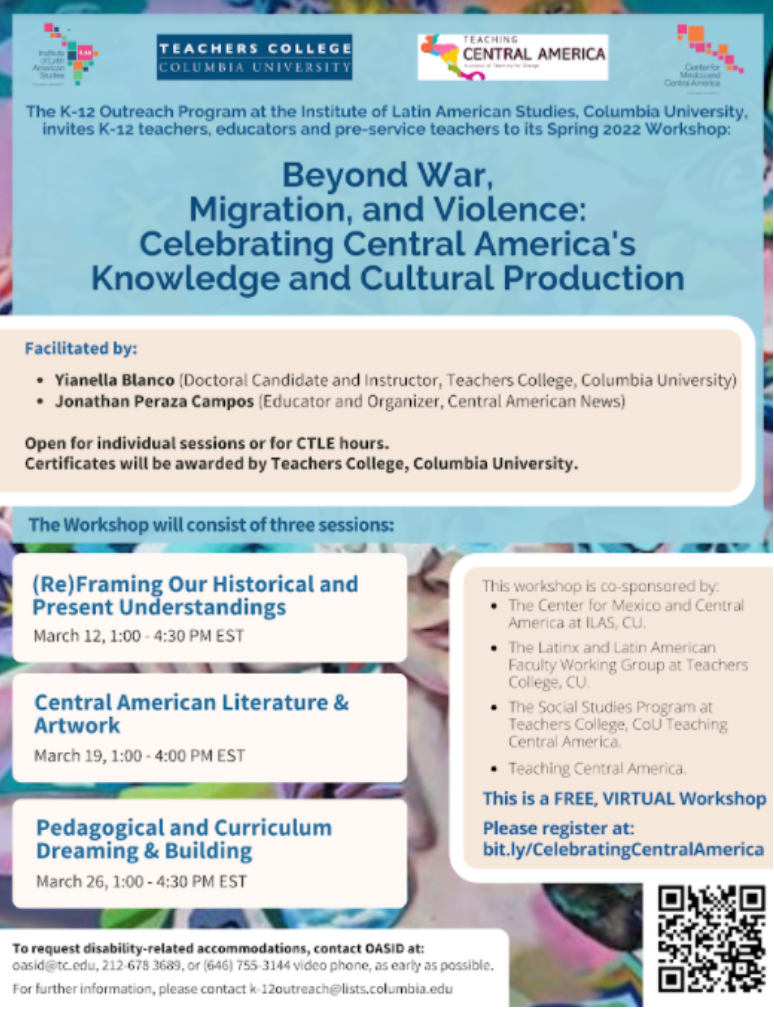
Beyond War, Migration, and Violence: Celebrating Central America's Knowledge and Cultural Production
The K-12 Outreach Program at the Institute of Latin American Studies, Columbia University, invites K-12 teachers, educators, and pre-service teachers to its Spring 2022 Workshop.
Open for individual sessions or for CTLE hours. Certificates will be awarded by Teachers College, Columbia University.
The Workshop will consist of three sessions:
- (Re)Framing Our Historical and Present Understandings: March 12, 1:00 - 4:30 PM EST
- Central American Literature & Artwork: March 19, 1:00 - 4:00 PM EST
- Pedagogical and Curriculum Dreamin & Building March 26, 1:00 - 4:30 PM EST
This workshop is co-sponsored by:
- The Center for Mexico and Central America at ILAS, CU.
- The Latinx and Latin American Faculty Working Group at Teachers College, CU.
- The Social Studies Program at Teachers College, CoU Teaching Central America.
- Teaching Central America. This is . REE, VIRTUAL Workshop
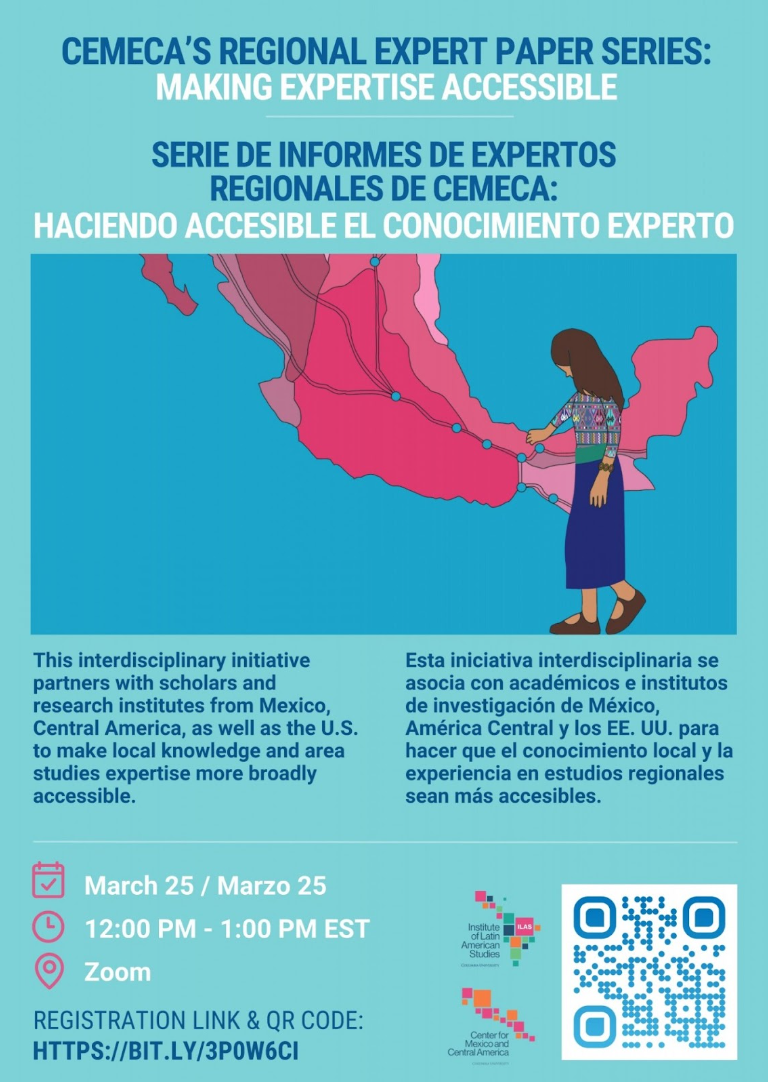
CeMeCA’s Regional Expert Paper Series: Making Expertise Accessible
Join us for the launch of the Center for Mexico and Central America’s new paper series. This interdisciplinary initiative partners with scholars and research institutes from Mexico, Central America, as well as the U.S. to make local knowledge and area studies expertise more broadly accessible. We will hear from the authors of our first paper “Conditions of Children in Guatemala” by Lauren Heidbrink, Sandra Chuc Norato, and María García Maldonado on the factors contributing to child migration from Guatemala.
To learn more, click here.
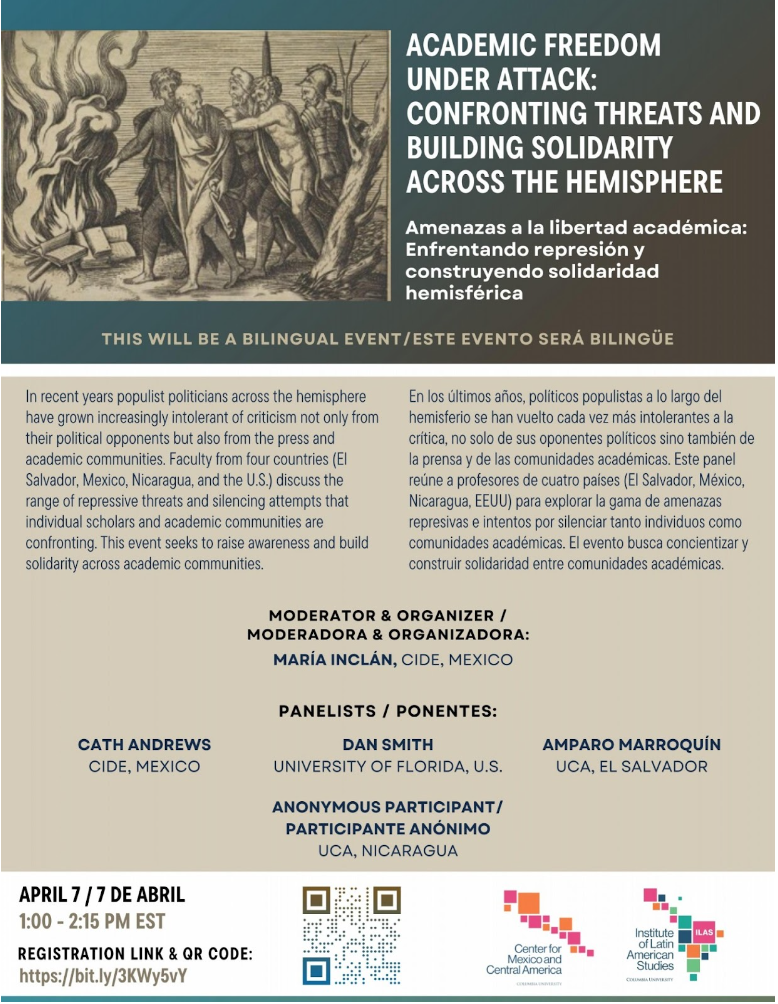
Academic Freedom Under Attack
In recent years populist politicians across the hemisphere have grown increasingly intolerant of criticism not only from their political opponents but also from the press and academic communities. Faculty from four countries (El Salvador, Mexico, Nicaragua, and the U.S.) discuss the range of repressive threats and silencing attempts that individual scholars and academic communities are confronting. This event seeks to raise awareness and build solidarity across academic communities.
This will be a bilingual event.
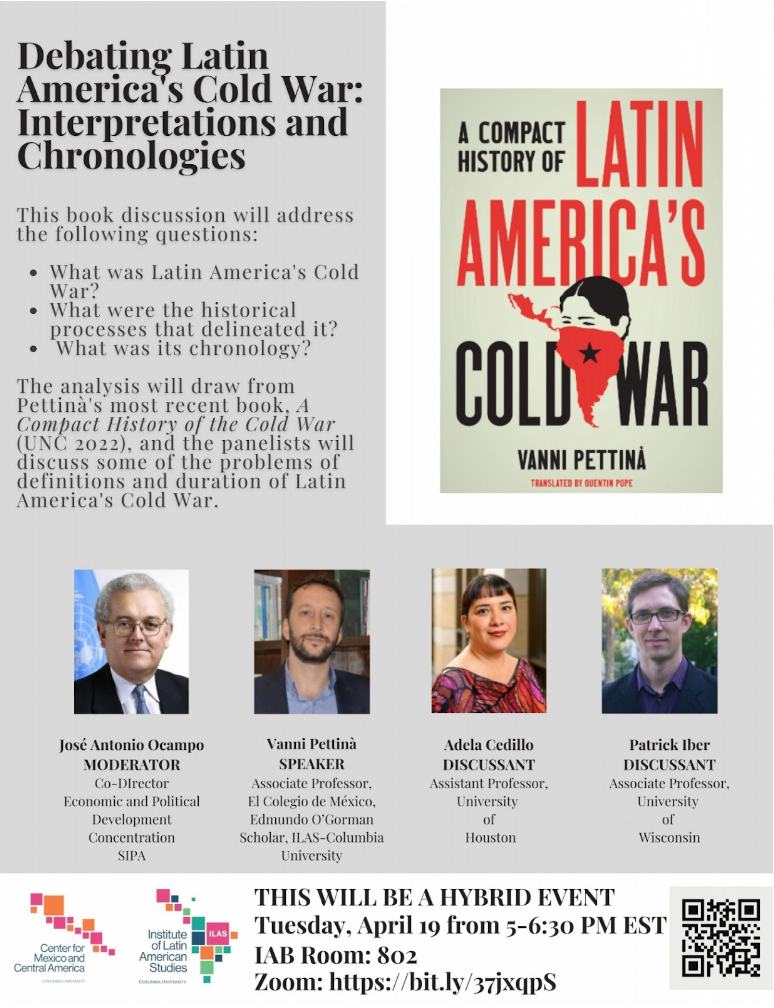
Debating Latin America's Cold War: Interpretations and Chronologies
What was the Latin America's Cold War? What historical processes marked it and what was its chronology? Drawing on the answers to such questions elaborated in Vanni Pettinà's Compact History of the Cold War (UNC 2022), the panelists will discuss problems of definitions and duration of Latin America's Cold War.
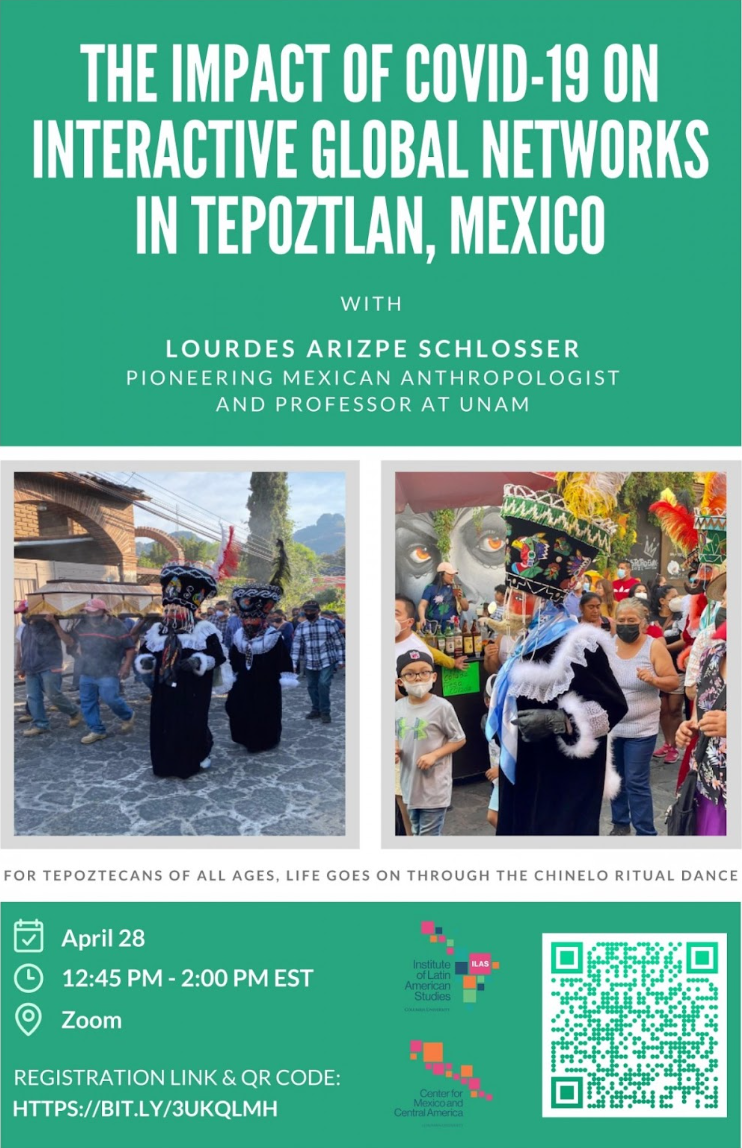
The Impact of Covid-19 on interactive global networks in Tepoztlan
Professor and pioneering Mexican anthropologist Lourdes Arizpe will present the impact of Covid-19 in Tepoztlán, Morelos, Mexico, based on her ongoing ethnographic study.
In addition, Professor Arizpe will be speaking about the major pathways and themes of analysis that anthropology could develop in the coming years of living with the pandemic.
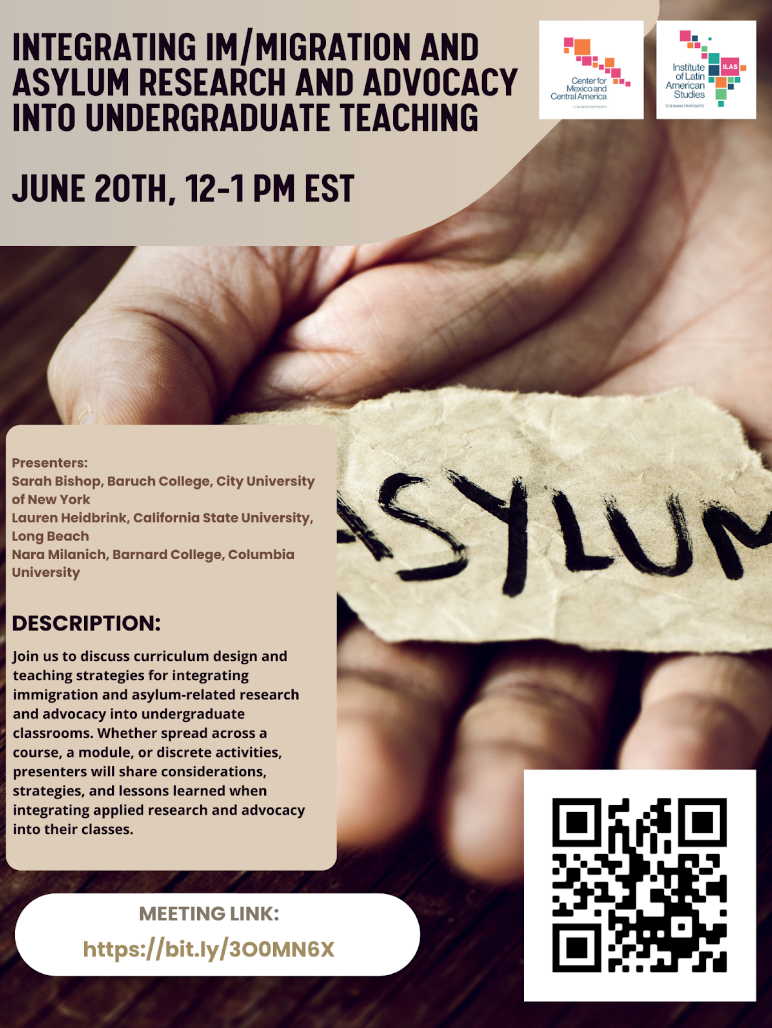
Integrating Im/migration and Asylum Research and Advocacy into Undergraduate Teaching
